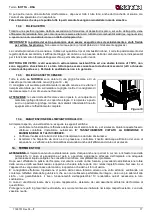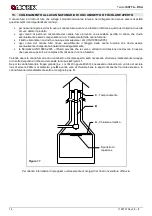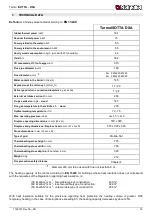
Termo
ISOTTA – DSA
28
7199701 Rev.05 – EN
hours, must exceed many times and for a given period of time the temperature of 350 °C before becoming
completely embedded in the metallic surfaces.
Therefore, it is extremely relevant to take these easy steps during the lighting:
1. Make sure that a strong air change is assured in the room where the appliance is installed.
2. During the first starts, do not load excessively the combustion chamber (about half the quantity indicated in
the instructions manual) and keep the product continuously ON for at least 6-10 hours with the registers less
open than the value indicated in the instructions manual.
3. Repeat this operation for at least 4-5 or more times, according to your possibilities.
4. Then load more and more fuel (following in any case the provisions contained in the installation booklet
concerning maximum load) and, if possible, keep the lighting periods long avoiding, at least in this initial
phase, short ON/OFF cycles.
5. During the first starts, no object should be leaned on the appliance and in detail on enamelled
surfaces. Enamelled surfaces must not be touched during heating.
6. Once the «break-in» has been completed, it is possible to use the product as the motor of a car, avoiding
abrupt heating with excessive loads.
To light the fire, it is suggested using small wood pieces together with paper or other traded lighting means.
It is
FORBIDDEN to use any liquid substance as for ex. alcohol, gasoline, oil and similar.
The openings for the air (primary and secondary) must be opened at the same time only for a short period (the
butterfly valve positioned on the fumes outlet pipe must also be opened). When the wood starts to burn, adjust the air
for combustion according to the indications in paragraph 10.
Please always be present during this phase.
Never switch on the device when there are combustible gases in the room.
ATTENTION: during the first ignitions a consistent condensation of fumes may take place with a small
escape of water from the thermoheating stove; this is a phenomenon that is destined to disappear in a
short amount of time, if it should, however, result persistent the flue chimney effect must be checked.
The thermoheating stove must never be overloaded. Too much fuel and too much air for combustion can
cause overheating and therefore damage the thermoheating stove. Damage caused by overheating is not
covered by the warranty.
10. NORMAL OPERATION
ATTENTION: For no reason must the fire be ignited before the system has been completely filled with water;
doing this would lead to serious damage of the entire structure.
The appliances with automatic door closure (type 1) must function, for safety reasons, with the door of the fireplace
closed (except to load fuel or to remove ash).
The appliances that do not have automatic door closure (type 2) must be connected to their own flue. Functioning with
the door open is only allowed under surveillance.
IMPORTANT: For safety reasons the door of the hearth can be opened only for the loading of the fuel. The
hearth door must always remain closed during operation or rest.
With the registers placed on the front of the appliance it is adjusted the emission of heat of the stove. They must be
opened according to the calorific need. The best combustion (with minimum emissions) is reached when, loading the
wood, most of the air for the combustion passes through the register of secondary air.
Never overload the stove (compare the technical table - max. quantity of loadable fuel).
Too much fuel and too much air for the combustion may cause overheating and then damage the stove, as a
consequence some scratches in the lower front part of the stove could happen.
The warranty does not cover the damages due to overheating of the equipment.
You should always use the stove with the door closed in order to avoid damages due to overheating (forge effect).
The adjustment of the registers, necessary to obtain a rating calorific performance with a depression on the chimney
of 17 - 20 Pa (= 1.7 - 2 mm water column) is the following:
FUEL
Primary Air (A)
Secondary Air (B)
Wood
CLOSED
OPEN
Mass of fuel hourly (kg/h)
4.4
Besides by the adjustment of air for the combustion, the intensity of combustion and then the calorific value of your
stove is affected by the chimney. A good flue of the chimney requires a more reduced adjustment of air for the
combustion, while a poor flue needs more an exact adjustment of air for combustion.















































